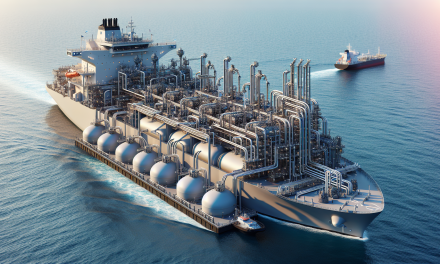Table of Contents
- Introduction
- Understanding Upstream Oil & Gas Operations
- Key Components of Upstream Operations
- Importance of Expert Training
- Advanced Technologies in Upstream Operations
- Career Opportunities in the Sector
- The Future of Upstream Oil & Gas
- FAQs
- Conclusion
Introduction
Welcome to the fascinating world of global upstream oil and gas operations, where innovation and efficiency shape the future of energy. In this blog, you will gain invaluable insights into the crucial aspects of upstream operations, which primarily involve the exploration and production of oil and natural gas. By understanding this dynamic sector, you will uncover not only the operational frameworks but also the growth prospects in the industry.
Understanding Upstream Oil & Gas Operations
Upstream oil and gas operations represent the first segment of the industry’s value chain. This phase focuses on identifying, extracting, and processing hydrocarbon resources. Notably, these operations require deep geological and engineering knowledge, as well as a firm grasp of environmental and regulatory considerations.
First and foremost, it’s essential to differentiate upstream operations from downstream and midstream activities. While upstream operations revolve around exploration and production, downstream processes deal with refining and distribution, and midstream focuses on transportation and storage.
Exploration Phase
During the exploration phase, geologists and geophysicists utilize advanced seismic technologies to locate potential reserves. By employing techniques such as 2D and 3D seismic surveys, they gather crucial data about subsurface formations. As a result, experts can interpret this data to identify where oil and gas accumulations are likely to exist.
Production Phase
Once reserves are confirmed, the production phase kicks in. Teams drill wells to extract oil and gas from the ground. Moreover, production engineers play a key role in optimizing recovery methods to ensure maximum efficiency and minimal environmental impact. Extraction techniques have evolved significantly, incorporating technologies like hydraulic fracturing and horizontal drilling to enhance output.
Key Components of Upstream Operations
Numerous essential components work collaboratively within upstream oil and gas operations. Understanding these key aspects ensures that individuals are well-equipped to navigate the complexities of the industry.
1. Geological Surveys
Geological surveys provide the foundational insights needed for successful exploration efforts. These studies not only assess potential drilling sites but also evaluate economic factors related to extraction costs.
2. Drilling Technology
Modern drilling techniques have revolutionized how companies approach extraction. Technologies such as rotary drilling and directional drilling have increased efficiency and safety. Therefore, upskilling in these areas can significantly enhance one’s employability.
3. Reservoir Management
Proper reservoir management ensures the longevity and profitability of production sites. Employing enhanced oil recovery (EOR) techniques allows companies to maximize their resource extraction, driving down costs and increasing output.
4. Regulatory Compliance
Operating in the oil and gas sector necessitates adherence to stringent environmental regulations. Hence, understanding these guidelines is vital for reducing ecological footprints and meeting regulatory standards.
Importance of Expert Training
Training programs focused on upstream oil and gas operations play an indispensable role in workforce development. By participating in targeted training initiatives, industry professionals can stay current with evolving technologies and practices.
For instance, consider the Expert Upstream Oil & Gas Operations Training Course. This program equips participants with essential skills and knowledge, enhancing their understanding of complex operational processes and best practices.
Knowledge Transfer
Moreover, structured training fosters knowledge transfer from seasoned professionals to newcomers in the field. As a result, organizations can maintain competency while enabling career advancement for their employees.
Practical Skills Development
Hands-on training experiences hone practical skills necessary for real-world application. This approach creates a workforce adept in utilizing cutting-edge technology and methodologies.
Advanced Technologies in Upstream Operations
Technological innovations continue to transform the landscape of upstream oil and gas operations. From artificial intelligence to IoT, various technologies enhance efficiency and safety.
1. Artificial Intelligence (AI)
AI applications are revolutionizing data analysis in exploration. By processing vast datasets, AI enables companies to make informed decisions more quickly and accurately, ultimately improving exploration success rates.
2. Internet of Things (IoT)
IoT devices play a crucial role in monitoring operations and predicting equipment failures. These smart devices can facilitate proactive maintenance, thereby reducing downtime and operational costs.
3. Drones
Drones have gained traction as vital tools for surveying and monitoring production sites. Equipped with advanced sensors and imaging technology, they provide real-time data, enhancing safety and efficiency in operations.
Career Opportunities in the Sector
The upstream oil and gas sector presents numerous career opportunities for individuals with a diverse skill set. From geologists to engineers and project managers, various roles exist within this vital industry.
1. Geological Engineers
Geological engineers play a pivotal role in assessing potential drilling sites. Their expertise in analyzing geological formations drives successful exploration efforts.
2. Petroleum Engineers
Pertaining to extraction techniques and production optimization, petroleum engineers are tasked with ensuring maximum resource recovery while adhering to environmental standards.
3. Project Managers
Project managers oversee operations, ensuring that projects meet their budget and timeline constraints. Effective communication and organization are essential skills in this role.
The Future of Upstream Oil & Gas
Looking ahead, the future of upstream oil and gas operations appears robust yet challenging. As the world shifts towards sustainable energy sources, this sector must adapt to evolving market dynamics.
To gain further insights into key operations related to petroleum, consider exploring these resources:
- Understanding Petroleum Refining and Petrochemicals: A Guide for Non-Technical Personnel
- Navigating the Essentials of Offshore Pipeline Engineering: A Comprehensive Guide
- A Comprehensive Guide to International Petroleum Management in Oil and Gas Operations
- Unlocking the Basics of Mechanical Engineering for Non-Mechanical Engineers
- Mastering Wastewater Management in the Oil Refinery and Petrochemical Industries
FAQs
What is the primary focus of upstream operations?
The primary focus of upstream oil and gas operations is the exploration and production of hydrocarbons. This phase involves finding oil and gas reserves, drilling wells, and extracting these resources for further processing.
How can I enhance my skills in the upstream oil and gas sector?
Participating in specialized training programs, such as the Expert Upstream Oil & Gas Operations Training Course, can significantly enhance your skills. Additionally, gaining practical experience through internships or entry-level positions is invaluable.
What are some challenges the industry faces?
The upstream oil and gas industry faces challenges, including fluctuating oil prices, intense competition, and increasing regulatory pressures. Furthermore, transitioning toward sustainable energy solutions adds another layer of complexity.
Are there opportunities for career advancement in the sector?
Yes, there are numerous opportunities for career advancement in upstream oil and gas. By developing technical expertise and gaining relevant experience, professionals can progress into managerial or specialized roles.
Conclusion
In conclusion, understanding global upstream oil and gas operations proves essential for professionals navigating this dynamic sector. The blend of technological advancements, strategic operations, and effective training initiatives equips individuals for success. Whether seeking to broaden knowledge or make career advancements, embracing the challenges and opportunities within upstream operations is crucial. Dive deeper into this field to unlock the potential of one of the world’s most vital industries!





